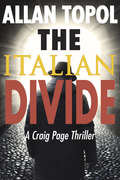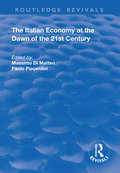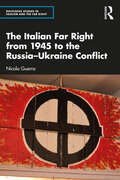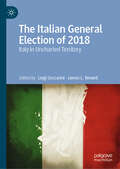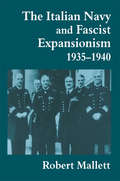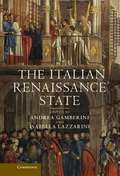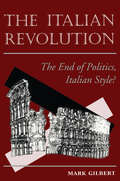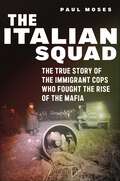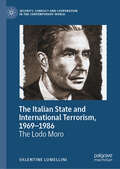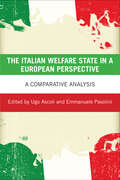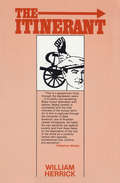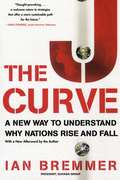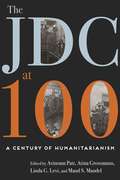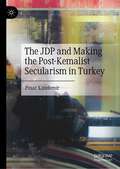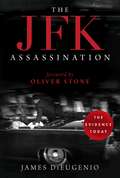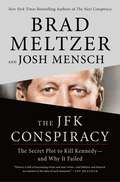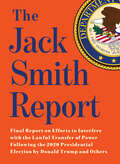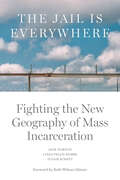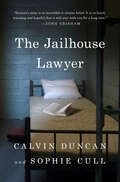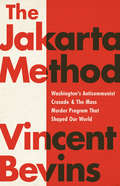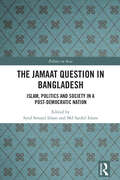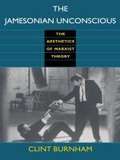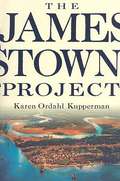- Table View
- List View
The Italian Divide (Craig Page Thriller #5)
by Allan TopolWhen prominent Italian banker Frederico Castiglione is murdered in an apparent jewelry robbery gone wrong, things are not what they seem. Former CIA Director Craig Page is enjoying his new life as Italian race car driver Enrico Marino—but when he hears that his friend and sponsor has been found dead, he suspects foul play. Shortly after Castiglione’s death, Italian banker Andrew Goldoni is asked to sell—or else. When he refuses, his daughter goes missing.
The Italian Economy at the Dawn of the 21st Century
by Massimo Di Matteo and Paolo PiacentiniThis title was first published in 2003. Most of the essays collected in this volume are the revised versions of the reports presented at a conference held at the University of Tokyo in October 2001, organised as part of the initiatives of the "Italian Year" in Japan, and supported by the Foundation Italy in Japan 2001, the Italian Chamber of Commerce in Tokyo, the Italian Ministries of Foreign Affairs and of Higher Education, and the University of Tokyo. The essays, which aim at a fact-based presentation, provide a thorough survey of the relevant problems and aspects of present-day Italian economy and society. Those peculiar features of the Italian economy, such as its dualistic industrial structure and territorial divide, are analysed at length, with an eye to open policy options. The economic analyses are complemented by presentations of some of the central topics on the Italian social framework, such as the role of family and the "Third Sector".
The Italian Far Right from 1945 to the Russia-Ukraine Conflict (Routledge Studies in Fascism and the Far Right)
by Nicola GuerraThe Italian Far Right from 1945 to the Russia–Ukraine Conflict provides a comprehensive account of the postwar parliamentary and extra parliamentary far right in Italy. This book explores the ideology, movements and activism of the extreme right and neo- fascists. The recent victory in the Italian parliamentary elections of the ‘postfascist’ party Fratelli d’Italia and its leader Giorgia Meloni highlights the importance of such research. The book examines why some of these movements participated with CIA- backing in the ‘Strategy of Tension’ in the years of the Cold War where terrorist actions aimed to keep Italy in NATO and prevent the Communist Party from coming to power, while other extreme- right groups vehemently opposed this and what they considered the dangerous ‘Americanization’ of the country. It debunks the myth that there was a unified postwar fascist movement in Italy, but instead excavates the complex battles within the extreme right as well as with their opponents from the left, and the authorities. This study is necessary to clarify the history and ideological dynamics of a political area still too often shrouded in mystery and whose geopolitical role is still poorly understood and generally underestimated. The analysis is contextualized in the present day by looking at the different perspectives of the Italian far right on the Russian invasion of Ukraine. The book will be of interest to researchers of political history, the Cold War and Italian history and politics.
The Italian Far Right from 1945 to the Russia-Ukraine Conflict (Routledge Studies in Fascism and the Far Right)
by Nicola GuerraThe Italian Far Right from 1945 to the Russia–Ukraine Conflict provides a comprehensive account of the postwar parliamentary and extra parliamentary far right in Italy. This book explores the ideology, movements and activism of the extreme right and neo- fascists. The recent victory in the Italian parliamentary elections of the ‘post-fascist’ party Fratelli d’Italia and its leader Giorgia Meloni highlights the importance of such research. The book examines why some of these movements participated with CIA- backing in the ‘Strategy of Tension’ in the years of the Cold War where terrorist actions aimed to keep Italy in NATO and prevent the Communist Party from coming to power, while other extreme- right groups vehemently opposed this and what they considered the dangerous ‘Americanization’ of the country. It debunks the myth that there was a unified postwar fascist movement in Italy, but instead excavates the complex battles within the extreme right as well as with their opponents from the left, and the authorities. This study is necessary to clarify the history and ideological dynamics of a political area still too often shrouded in mystery and whose geopolitical role is still poorly understood and generally underestimated. The analysis is contextualized in the present day by looking at the different perspectives of the Italian far right on the Russian invasion of Ukraine. The book will be of interest to researchers of political history, the Cold War and Italian history and politics.
The Italian General Election of 2018: Italy in Uncharted Territory
by James L. Newell Luigi CeccariniThis book provides a lively and comprehensive account of the unprecedented Italian general election of 2018 and of its profound significance for Italy and beyond. The contributions in this volume cover the political, economic and international contexts in which the vote took place, and consider the main election contenders in the run-up to the election as well as the campaigns. The book further examines the election outcome, analysing the votes and discussing the impact of the election on the turnover of parliamentary personnel as well as examining the outcome from the viewpoint of government formation.
The Italian Navy and Fascist Expansionism, 1935-1940 (Cass Series: Naval Policy and History #No. 7)
by Robert MallettRobert Mallett argues that the Duce's aggressive war against the Mediterranean powers, Britain and France, was to secure access to the world's oceans. Mussolini actively pursued the Italo-German alliance to gain a Fascist empire stretching from the Mediterranean to the Indian Ocean.
The Italian Renaissance State
by Andrea Gamberini Isabella Lazzarini"This magisterial study proposes a revised and innovative view of the political history of Renaissance Italy. Drawing on comparative examples from across the peninsula and the kingdoms of Sicily, Sardinia and Corsica, an international team of leading scholars highlights the complexity and variety of the Italian world from the fourteenth to early sixteenth centuries, surveying the mosaic of kingdoms, principalities, signorie and republics against a backdrop of wider political themes common to all types of state in the period. The authors address the contentious problem of the apparent weakness of the Italian Renaissance political system. By repositioning the Renaissance as a political, rather than simply an artistic and cultural phenomenon, they identify the period as a pivotal moment in the history of the state, in which political languages, practices and tools, together with political and governmental institutions, became vital to the evolution of a modern European political identity"--
The Italian Revolution: The End Of Politics, Italian Style?
by Mark Gilbert<p>Since 1992, Italy has been rocked by the disintegration of its traditional ruling elite as dozens of leading politicians have been accused of corruption, extortion, and Mafia ties. The two linchpins of the former governing coalition, the Christian Democrats and the Socialists, have been shattered by scandal and humiliated at the polls. New political forces, such as the Northern League, have rushed to fill the vacuum. The traditional opposition, the Communist Party, changed its name to the Democratic Party of the Left in 1991 and has since emerged as the leader of a coalition of progressive forces that may yet prove itself as Italy's natural government. The neofascist Italian Social Movement, profiting from the chaos, has become the largest party in Italy's economically depressed South. All these political disturbances have taken place against a backdrop of mounting economic worries and an internecine war between the state and the Mafia. <p>These political convulsions could well be designated a revolution. Since the fall of the Fourth Republic in France, no Western nation has undergone such a dramatic period of upheaval. This clear and balanced book provides both a historical account of the circumstances that led to la rivoluzione italiana and an explanation of why it took place after decades of complacency.</p>
The Italian Squad: The True Story of the Immigrant Cops Who Fought the Rise of the Mafia
by Paul MosesThe unknown inside story of the NYPD’s Italian-born detectives who fought both powerful gangsters and the deeply ingrained prejudice against their own beloved immigrant communityThe story begins in Sicily, on Friday, March 12, 1909, at 8:45 p.m. Three gunshots thundered in the night, and then a fourth. Two men fled, and investigators soon discovered who they had killed: Giuseppe Petrosino, the legendary American detective whose exploits in New York were celebrated even in Italy.The Italian Squad, by veteran New York City journalist and historian Paul Moses, explores the lives of the nationally celebrated detectives who followed in the slain Petrosino’s footsteps as leaders of the New York City investigative squad: Anthony Vachris, Charles Corrao, and Michael Fiaschetti. Drawing on new primary sources such as private diaries and city, state, and federal documents, this dramatic narrative history follows the Italian Squad across the first two decades of the twentieth century as its detectives battled increasingly powerful gangsters, political obstacles and deeply ingrained prejudice against their own beloved Italian immigrant community.Vachris, Corrao, and Fiaschetti became, like Petrosino, famous for meting out tough justice to criminals who comprised the “Black Hand.” Beyond trying to prevent horrific crimes—nighttime bombings in crowded tenements, kidnappings that targeted children at play, gangland shootings that killed innocent bystanders—the Italian Squad commanders hoped to persuade society of what they knew for themselves: that their fellow immigrant Italians, so often maligned, would make good American citizens.In this explosive story, Moses carefully strips away the mythology that has always enveloped the Italian Squad and offers instead a nuanced portrait of brave but flawed men who fought the good fight for their people and their city.
The Italian State and International Terrorism, 1969–1986: The Lodo Moro (Security, Conflict and Cooperation in the Contemporary World)
by Valentine LomelliniThis book sheds light on the so-called ‘Moro Doctrine’, an Italian state security policy which has been portrayed in literature as an under-the-counter agreement made between Italy and Palestinian movement during the Cold War. The Moro Doctrine, or ‘Lodo Moro’ as it is known in Italy, aimed to protect the peninsula from Palestinian attacks by allowing terrorists to use Italian territory as a base for weapons and guerrilla fighters.Responsibility for the ‘Lodo’ was instrumentally placed on Aldo Moro, the five- time Prime Minister of Italy, after his death, and since then his name has become indelibly linked with the shame of having negotiated with Palestinian terrorists.Thanks to records collected from over twenty archives in Italy, the USA, France, Germany, Britain and Russia, concrete evidence shows that the significance of this agreement needs to be rethought. The author argues that the decision to adopt the Lodo was not solely made by Moro, but also involved key figures of the Christian Democrat and Socialist parties, various magistrates and even the President of the Republic. It illustrates how terrorism was used as an effective tool in international diplomacy to influence foreign and domestic policies.Offering a re-examination of Italian counter-terrorist policy, this book analyses how Italy responded to international terrorism during the Cold War, providing a useful read for those researching Italian and European history, Cold War studies, the history of international relations and diplomacy, and Middle-East history.
The Italian Welfare State in a European Perspective: A Comparative Analysis
by Edited by Ugo Ascoli and Emmanuele PavoliniThere is a need to understand the Italian welfare state, but as yet it has received little academic research attention. The Italian Welfare State in a European Perspective is the first book to explore the evolution of Italy's welfare state in the decades since the ‘Trente Glorieuses’ (1945–75). It offers a rare overview and analysis of the Italian situation based on an in-depth study of the main social policy fields (including education, higher education and taxation policies), a detailed analysis of the connection between policies and their outputs/outcomes and a comparative perspective framing the Italian case within the European context. This is the first English-language book to take a comparative look at the Italian welfare state as a whole since the 2008 economic crisis, It will be a valuable resource for academics and researchers, as well as students.
The Itinerant
by William HerrickA rowdy book; Tom Jones with a lacing of Karl Marx, as its hero plunges through the 20th century--the Depression, the Spanish Civil War, World War II--at a gallop.
The J Curve
by Ian BremmerLocate nations on the J Curve -- left for authoritarian, right for democratic. Then figure out how to force those on the left to open their societies, rather than encouraging them to shut them tighter by further isolating them. The West's isolation of Kim Jong-il's North Korea gives him the cover he needs to extend his brutal regime (the mistake the U.S. made for a long time with Saddam Hussein and Castro); in Saudi Arabia, western governments should encourage manageable change before the country breaks apart; they should help strengthen China's economy so it can further liberalize; they must encourage Israel to decide what kind of country it will be. Filled with imaginative and surprising examples of how to correct outworn political ideas, The J Curve points the way for western governments to lead the way to a realistic political balance and a healthier economic future.
The JDC at 100: A Century of Humanitarianism
by Atina Grossmann Elissa Bemporad Maud S. Mandel Avinoam Patt Linda G. Levi Mikhail Mitsel Jaclyn Granick Suzanne D. Rutland Veerle Vanden Daelen Laura Hobson Faure Anna Sommer Schneider Kierra Crago-Schneider Inga Veksler Marion Kaplan Kaplan Rakefet Zalashik Zhava Litvac GlaserThe JDC at 100: A Century of Humanitarianismtraces the history of the JDC—an organization founded to aid victims of World War I that has played a significant role in preserving and sustaining Jewish life across the globe. The thirteen essays in this volume, edited by Avinoam Patt, Atina Grossmann, Linda G. Levi, and Maud S. Mandel, reflect critically on the organization’s transformative impact on Jewish communities throughout the world, covering topics such as aid for refugees from National Socialism in Cuba, Shanghai, Tehran, the Dominican Republic, France, Belgium, and Australia; assistance to Holocaust survivors in Displaced Persons camps for rebuilding and emigration; and assistance in Rome and Vienna to Soviet Jewish transmigrants in the 1970s. Despite the sustained transnational humanitarian work of this pioneering non-governmental organization, scholars have published surprisingly little devoted to the history and remarkable accomplishments of the JDC, nor have they comprehensively explored the JDC’s role on the ground in many regions and cultures. This volume seeks to address those gaps not only by assessing the widespread impact of the JDC but also by showcasing the richness and depth of the JDC Archives as a resource for examining modern Jewish history in global context. The JDC at 100 is addressed to scholars and students of humanitarian aid, conflict, displacement, and immigration, primarily in Jewish, European, and American history. It will also appeal to readers with a more general interest in Jewish studies and refugee studies, Holocaust museum professionals, and those engaged in Jewish and other relief and resettlement programs.
The JDP and Making the Post-Kemalist Secularism in Turkey
by Pinar KandemirThis book is an analytical study of secularism in contemporary Turkey by tracing its historical trajectory within the context of political transformation in a country that experienced a social and cultural rupture in its formative years. Its principal focus is on the policies and practices of the current ruling party, the Justice and Development Party (JDP), which has influenced the process of change, evolution, and transformation with regard to secularism and state policies toward religion. Following its foundation in 2001, the JDP developed a unique approach to conceptualising the relationship between state and religion. In contrast to other mainstream parties and political positions both in the past and present, it offers an alternative vision and model to that of inherited Kemalist secularism, as formulated by Mustafa Kemal Ataturk (the founder of modern Turkey) and refined by his close associates in the formative period of the Republic. The project draws its findings from in-depth interviews with members of political parties, civil society activists and religious leaders.
The JFK Assassination: Probe Magazine On Jfk, Mlk, Rfk, And Malcolm X
by Oliver Stone James DiEugenioIn this updated and revised edition, James DiEugenio dissects the new Oscar-nominated film, The Post, and how it disingenuously represents the Pentagon Papers saga, to the detriment of the true heroes of the operation. The story of the film stems from the failed attempt of Academy Award–winning actor Tom Hanks and producer Gary Goetzman to make Vincent Bugliosi’s mammoth book about the Kennedy assassination, Reclaiming History, into a miniseries. He exposes the questionable origins of Reclaiming History in a dubious mock trial for cable television, in which Bugliosi played the role of an attorney prosecuting Lee Harvey Oswald for murder, and how this formed the basis for the epic tome. JFK: The Evidence Today lists the myriad problems with Bugliosi’s book and explores the cooperation of the mainstream press in concealing many facts during the publicity campaign for the book and how this lack of scrutiny led Hanks and Goetzman—cofounders of the production company Playtone—to purchase the film rights. DiEugenio then shows how the failed film adapted from that book, entitled Parkland, does not resemble Bugliosi’s book and examines why. This book reveals the connections between Washington and Hollywood, as well as the CIA influence in the film community today. It includes an extended look at the little-known aspects of the lives and careers of Bugliosi, Hanks, and Goetzman. JFK: The Evidence Today sheds light on the Kennedy assassination, New Hollywood, and political influence on media in America.
The JFK Conspiracy: The Secret Plot to Kill Kennedy—and Why It Failed
by Brad Meltzer Josh MenschINSTANT NEW YORK TIMES BESTSELLERFrom the New York Times bestselling authors of The Nazi Conspiracy and The Lincoln Conspiracy comes a true, little-known story about the first assassination attempt on John F. Kennedy, right before his inauguration.Kennedy, the thirty-fifth president of the United States, is often ranked among Americans’ most well-liked presidents. Yet what most Americans don’t know is that JFK’s historic presidency almost ended before it began—at the hands of a disgruntled sociopathic loner armed with dynamite.On December 11, 1960, shortly after Kennedy’s election and before his inauguration, a retired postal worker named Richard Pavlick waited in his car—a parked Buick—on a quiet street in Palm Beach, Florida. Pavlick knew the president-elect’s schedule. He knew when Kennedy would leave his house. He knew where Kennedy was going. From there, Pavlick had a simple plan—one that could’ve changed the course of history.Written in the gripping, page-turning style that is the hallmark of Brad Meltzer and Josh Mensch’s bestselling series, this is a slice of history vividly brought to life. Meltzer and Mensch are at the top of their game with this brilliant exploration of what could’ve been for one of the most compelling leaders of the 20th century.
The Jack Smith Report: Final Report on Efforts to Interfere with the Lawful Transfer of Power Following the 2020 Presidential Election by Donald Trump and Others
by Jack SmithThe full, unexpurgated final report of special prosecutor Jack Smith, regarding his two-year investigation of Donald Trump for attempting to overturn the results of the 2020 presidential election.The evidence from the investigation includes grand jury testimony from 55 witnesses, interviews by Smith&’s criminal investigators with over 250 people, photographs, information from electronic devices and online records—including Trump&’s social media account—and more.&“Our work rested upon the fundamental value of our democracy that we exist as &‘a government of laws, and not of men . . .&’ Simply put: the Department of Justice&’s guiding mandate, which my Office strove to uphold, is that power, politics, influence, status, wealth, fear, and favor should not impede justice under the law . . . My Office had one north star: to follow the facts and law wherever they led. Nothing more and nothing less . . . But for Mr. Trump&’s election and imminent return to the Presidency, the Office assessed that the admissible evidence was sufficient to obtain and sustain a conviction at trial.&” —From Jack Smith&’s Cover Letter to Attorney General Merrick GarlandThe Jack Smith Report continues Melville House's "tradition of publishing pivotal public documents."—The New York Times
The Jail is Everywhere: Fighting the New Geography of Mass Incarceration
by Judah Schept Jack Norton Lydia Pelot-HobbsA VITAL COLLECTION FROM A KEY BATTLEGROUND IN THE ABOLITION STRUGGLE: THE COUNTY JAILNearly every county and major city in the United States has a jail, the short-term detention center controlled by local sheriffs that funnels people into prisons and long-term incarceration. While the growing movement against incarceration and policing has called to reform or abolish prisons, jails have often gone unnoticed, or in some cases seen as a "better" alternative to prisons."Yet jails, in recent decades, have been the fastest-growing sector of the US carceral state. Jails are widely used for immigrant detention by ICE and the U.S. Marshals and as a place to offload people that prisons can't hold. As jails grow, they transform the region around them, and whole towns and small cities see health care, mental health care, substance abuse, and employment opportunities taken over by carceral concerns.If jails are everywhere, resistance to jails is too. The recent jail boom has sparked a wealth of local activist struggles to resist and close jails all across the United States, from rural counties to major cities. The Jail Is Everywhere brings these disparate voices together, with contributions from activists, scholars, and expert journalists describing the effects of this quiet jail boom, mapping the growth of the carceral state, and sharing strategies from recent fights against jail construction to strengthen struggles against jailing everywhere.With a foreword by Ruth Wilson Gilmore.
The Jailhouse Lawyer
by Calvin Duncan Sophie Cull&“Duncan&’s story is so incredible it strains belief. It is so heartwarming and hopeful that it will stay with you for a long time.&” —John Grisham"This brilliantly told story—at once maddening and miraculous—is among the most powerful indictments of our criminal justice system I&’ve ever read.&” —James Forman, Jr.A searing and ultimately hopeful account of Calvin Duncan, &“the most extraordinary jailhouse lawyer of our time&” (Sister Helen Prejean), and his thirty-year path through Angola after a wrongful murder conviction, his coming-of-age as a legal mind while imprisoned, and his continued advocacy for those on the insideCalvin Duncan was nineteen when he was incarcerated for a 1981 New Orleans murder he didn&’t commit. The victim of a wildly incompetent public defense system and a badly compromised witness, Duncan was left to rot in the waking nightmare of confinement. Armed with little education, he took matters into his own hands.At twenty-one, he filed his first motion from prison: &“Motion for a Law Book,&” which launched his highly successful, self-taught legal career. Trapped within this wholly corrupted system, Duncan became a legal advocate for himself and his fellow prisoners as an inmate counsel at the infamous Louisiana State Penitentiary, Angola. Literature sustained his hope, as he learned the law in its shadow.During his decades of incarceration, Duncan helped hundreds of other prisoners navigate their cases, advocating for those the state had long since written off. He taught a class in the midst of Angola to empower other incarcerated men to fight for their own justice under the law. But his own case remained stalled. A defense lawyer once responded to Duncan&’s request for documents: &“You are not a person.&”Criminal justice reform advocate Sophie Cull met Duncan after he was finally released from prison; he began to tell her his story. Together, they&’ve written a bracing condemnation of the criminal legal system, and an intimate portrait of a heroic and brilliant man&’s resilience in the face of injustice.
The Jakarta Method: Washington's Anticommunist Crusade and the Mass Murder Program that Shaped Our World
by Vincent BevinsNAMED ONE OF THE BEST BOOKS OF THE YEAR BY NPR, THE FINANCIAL TIMES, AND GQ&“A radical new history of the United States abroad&” (Wall Street Journal) which uncovers U.S. complicity in the mass-killings of left-wing activists in Indonesia, Latin America and around the world In 1965, the US government helped the Indonesian military kill approximately one million innocent civilians—eliminating the largest Communist Party outside China and the Soviet Union and inspiring other copycat terror programs. In this bold and comprehensive new history, Vincent Bevins draws from recently declassified documents, archival research, and eyewitness testimony to reveal a shocking legacy that spans the globe. For decades, it&’s been believed that the developing world passed peacefully into the US-led capitalist system. The Jakarta Method demonstrates that the brutal extermination of unarmed leftists was a fundamental part of Washington&’s final triumph in the Cold War.
The Jamaat Question in Bangladesh: Islam, Politics and Society in a Post-Democratic Nation (Politics in Asia)
by Md Saidul Islam Syed Serajul IslamThe Jamaat Question in Bangladesh addresses the complex intersection of global politics and local dynamics in Bangladesh, particularly in relation to Bangladesh Jamaat-e-Islami (Jamaat). With multidisciplinary insights and perspectives, the contributors to this volume provide an objective socio-historical analysis of Islam, politics and society in Bangladesh. Separating fact from fiction, they attempt to uncover the truth about Jamaat, the largest Islam-based political party in the country. Suppressed and marginalized by the BAL regime, Jamaat remains active in the social landscape of Bangladesh. What makes Jamaat so resilient against all odds? Can it peacefully coexist with rival political parties in a polarised nation such as Bangladesh? This book seeks to answer these crucial questions. An essential read for those interested in Bangladeshi politics and political Islam.
The James Ryker Trilogy: The Red Cobra, The Black Hornet, and The Silver Wolf (The James Ryker Series)
by Rob SinclairThree unmissable espionage thrillers in one great-value ebook. “If you love the Bourne series then you absolutely have to read the James Ryker series.” —My Chestnut Reading TreeThe Red CobraEx-intelligence agent James Ryker wants nothing more than to start a new life away from chaos, violence, destruction and deceit. But his short-lived idyll is destroyed when the fingerprints of a murdered woman in Spain match those of a former adversary who’s been missing and presumed dead for years: an infamous female assassin.“Will grab you round the throat and not let you go until the very last page, with an OMFG ending . . . a must read for fans of Lee Child and Robert Ludlum.” —Chelle’s Book ReviewThe Black HornetWhat do you do when the love of your life vanishes without a trace? If you’re James Ryker you search for the answers whatever the cost, however much blood and sacrifice it takes—even if it means getting on the wrong side of a notorious Mexican drug lord. “With yet more twists and turns this is another action packed read that is a commendable follow up to what was an amazing start to a series.” —bytheletterbookreviewsThe Silver WolfFollowing the trail of his missing wife from the crystal waters of Mexico’s Caribbean coast back to England, the country of his birth, Ryker discovers more than even he bargained for. The faint clues to many events in his recent past are all seemingly linked to one mysterious character: The Silver Wolf.“It has everything you’d want in an espionage thriller—a tight twisty plot, great characters, horrible villains and surprise twists.” —Between the Lines
The Jamesonian Unconscious: The Aesthetics of Marxist Theory
by Clint BurnhamImagine Fredric Jameson--the world's foremost Marxist critic--kidnapped and taken on a joyride through the cultural ephemera, generational hype, and Cold War fallout of our post-post-contemporary landscape. In The Jamesonian Unconscious, a book as joyful as it is critical and insightful, Clint Burnham devises unexpected encounters between Jameson and alternative rock groups, new movies, and subcultures. At the same time, Burnham offers an extraordinary analysis of Jameson's work and career that refines and extends his most important themes.In an unusual biographical move, Burnham negotiates Jameson's major works--including Marxism and Form, The Political Unconscious, and Postmodernism, or, The Cultural Logic of Late Capitalism--by way of his own working-class, queer-ish, Gen-X background and sensibility. Thus Burnham's study draws upon an immense range of references familiar to the MTV generation, including Reservoir Dogs, theorists Slavoj Zizek and Pierre Bourdieu, The Satanic Verses, Language poetry, the collapse of state communism in Eastern Europe, and the indie band Killdozer. In the process, Burnham addresses such Jamesonian questions as how to imagine the future, the role of utopianism in capitalist culture, and the continuing relevance of Marxist theory.Through its redefinition of Jameson's work and compelling reading of the political present, The Jamesonian Unconscious defines the leading edge of Marxist theory. Written in a style by turns conversational, playful, and academic, this book will appeal to students and scholars of Marxism, critical theory, aesthetics, narratology, and cultural studies, as well as the wide circle of readers who have felt and understood Jameson's influence.
The Jamestown Project
by Karen Ordahl KuppermanCapturing England's intoxication with a wider world through ballads, plays, and paintings, and the stark reality of Jamestown--for Indians and Europeans alike--through the words of its inhabitants as well as archeological and environmental evidence, Kupperman re-creates these formative years with astonishing detail.
